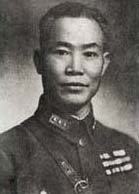Chen Cheng (General)
Chen Cheng ( Chinese 陳誠 / 陈诚 , Pinyin Chén Chéng , born January 4, 1897 in Gaoshi, Qingtian County, Zhejiang Province , † March 5, 1965 in Taipei ) was in the Republic of China (1912-1949) a military and a politician and later Vice President of the Republic of China (Taiwan) .
Life
Born the son of a small landowner, Chen attended Lishui General School and Hangzhou Provincial School, and joined Baoding Military Academy in 1918 , where he specialized in artillery . During his training, which lasted until 1922, he joined the Kuomintang in the summer of 1920 . Appointed as an instructor at the Whampoa Military Academy in 1924 , he developed a lifelong friendship with Chiang Kai-shek , and an equally permanent aversion to He Yingqin, the then chief instructor of the military academy.
War missions
In the northern campaign against warlords in northern China was from 1926 staff officer with the rank of lieutenant colonel . In the following year he was promoted to brigadier general and command of a division . After Chinese reunification , Chen participated in the suppression of communist unrest in Jiangxi Province in 1928 and in the 1929 Soviet-Chinese border war .
In the early 1930s, he led a series of military operations against communists, which eventually forced them to the so-called Long March in northern China. In March 1935, Chen was tasked with reorganizing the cavalry , artillery, and engineering forces of the National Revolutionary Army . In 1936 he served again in the civil war against the communists, this time in Shanxi . After the Xi'an incident in December 1936, in which Chen Cheng and Chiang Kai-shek were temporarily controlled by Zhang Xueliang , the Chinese nationalists united with the communists in a united front .
At the beginning of the Sino-Japanese War , Chen was one of Chiang Kai-shek's most important advisers, including in the Battle of Shanghai . It was partly his idea to lure the Japanese south and inland rather than facing them in the north, where they had a solid logistical base. During the Battle of Wuhan , Chen was the commander of the 9th Military Region and also the governor of Hubei Province . After the government fled to Chongqing , he led the area's defense. During the Battle of Changsha in 1939, he became the commander of the 6th Military Region in southern Hubei.
In the Battle of West Hubei in 1943, Chen Cheng achieved a strategic victory over the Japanese. He was then appointed commander of the Chinese Expeditionary Forces in Burma . In this role, he again came into conflict with He Yingqin. After the start of the Japanese Operation Ichi-gō in the spring of 1944, he was recalled to China to take action against the communists again. In December of that year he was appointed Minister of Defense of the Republic of China.
post war period
After the capitulation of Japan , Chen was appointed Chief of the General Staff by Chiang and in 1947 Commander in Chief of the northeastern headquarters in Manchuria . He had to give up the latter position in early 1948 to undergo medical surgery. He was then appointed governor of Taiwan Province, where he declared a state of emergency in May 1949, which was to last for 38 years.
In March 1950, Chen took over the chairmanship of the Executive Yuan (government) in Taipei. In 1952 a land reform took place under his leadership. In March 1954 and again in March 1960 he was elected Vice President of the Republic of China. In this capacity, he traveled to the USA in the summer of 1961 to strengthen relations between the two countries. Between 1958 and 1963 he was again prime minister. He died of liver cancer in 1965 .
family
Chen married Tan Xiang, the daughter of Tan Yankai, who served as Prime Minister of the Republic of China in 1928. Their son Chen Li-an (* 1937) held various offices as ministers and was an independent candidate for the presidential election in the Republic of China (Taiwan) in 1996 .
literature
- Edwin Pak-Wah Leung (Ed.): Political Leaders of Modern China: A Biographical Dictionary. Greenwood Publishing, 2002, ISBN 0-313-30216-2 , pp. 13 f.
Web links
| personal data | |
|---|---|
| SURNAME | Chen, Cheng |
| ALTERNATIVE NAMES | 陳誠 (Chinese) |
| BRIEF DESCRIPTION | Chinese military and politician, Vice President of the Republic of China |
| DATE OF BIRTH | January 4, 1897 |
| PLACE OF BIRTH | Gaoshi, Qingtian County, Zhejiang Province |
| DATE OF DEATH | March 5, 1965 |
| Place of death | Taipei |

